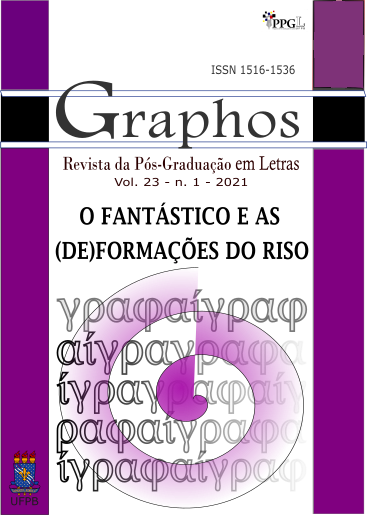The role of humor in the suburban fantastic cinema
DOI:
https://doi.org/10.22478/ufpb.1516-1536.2021v23n1.57548Keywords:
Suburban Fantastic Cinema, Suburbs, Humor, Genre, Middle ClassAbstract
O subúrbio estadunidense é marcado por um recorte social bastante específico: uma classe média branca, arraigada em um discurso meritocrata e vinculada ao “Sonho Americano”. Sua imagem idílica foi consolidada desde os anos 1950 pelas sitcoms de subúrbio, mas também passou a ser contraposta pelo suburbanismo gótico – gênero literário que também encontrou ambiente fértil no audiovisual. Nestes subgêneros o humor se apresenta de forma dicotômica e contraditória, que pode ser resumido nas seguintes máximas: rir conosco ou rir de nós. Nosso interesse nesse artigo passa a ser na investigação do uso do humor em um terceiro subgênero, este muito mais recente: o suburbanismo fantástico. Definido por McFadzean (2019, p.1) como um conjunto de filmes Hollywoodianos que começaram a aparecer nos anos 1980, onde crianças e adolescentes que vivem no subúrbio são chamados para confrontar uma força fantástica e disruptiva, tais quais E.T. – O Extraterrestre, Os Goonies e De Volta Para o Futuro. O presente trabalho então se aprofunda no papel mercadológico, narrativo e moral do humor nessas narrativas, considerando tanto o seu público alvo, como sua natureza sintática explicitamente reacionária, e que, por isso, contrapõe a natureza subversiva tanto da comédia quanto da fantasia – gêneros que se fundamentam no confronto, respectivamente, das expectativas e das regras do real.
Downloads
References
BERGSON, Henri. O riso. Rio de Janeiro: Martins Fontes, 2004.
BRITTON, Andrew. Britton on Film: The Complete Film Criticism of Andrew Britton. Detroit: Wayne State University Press, EUA, 2009
COONTZ, Stephanie. The Way We Never Were: American Families and the Nostalgia Trap. New York: Basic Books, 2000
DWYER, Michael. Back to the fifties. Nostalgia, Hollywood film, and popular music of the seventies and eighties. New York: Oxford University Press, 2015.
EHRMAN, John. The eighties: American in the Age of Reagan. New Haven: Yale University Press, 2005.
FORREST, David; HARPER, Graeme; RAYNER, Jonathan (eds.). Filmurbia: screening the suburbs. London: Palgrave Macmillan, 2017.
GEORGE, Suzan. Gendering science fiction films: invaders from the suburbs. New York: Palgrave Macmillan, 2013.
HANLON, Bernadette. Once the American dream: inner-ring suburbs of the metropolitan United States. Philadelphia, Pennsylvania: Temple University Press, 2009.
JONES, Darryl; McCARTHY, Elizabeth; MURPHY, Bernice (Eds.). It came from the 1950s!. London: Palgrave Macmillan, 2011.
JURCA, Catherine. White Diaspora. The Suburb and the Twentieth-Century American Novel. New Jersey: Princeton University Press, 2001
McFADZEAN, Angus. The suburban fantastic: a semantic and syntactic grouping in contemporary Hollywood cinema. Science Fiction Film and Television, Volume 10, Nº 1 Liverpool University, Uk., pp. 1-25 2017
McFADZEAN, Angus. Suburban fantastic cinema: growing up in the late twentieth century. New York: Wallflower Press, Columbia University, 2019
MURPHY, Bernice. The suburban gothic in American popular culture. Basingstoke: Palgrave Macmillan, 2009
OLSON, Lars. Great Expectations: The Role of Myth in 1980s Films with Child Heroes. Blacksburg: Viginia Polytechic Institute, 2011
PRINCE, Stephen. American cinema of the 1980s. New Brunswick, NJ: Rutgers University Press, 2007
ROAS, David (ed.) Teorias de lo fantastico. Madrid: Arco Libros, 2001.
ROWLEY, Stephen. Movie towns and sitcom suburbs: building Hollywood’s ideal communities. New York: Palgrave Macmillan, 2015
SANTOS, Roberto Elísio dos. Reflexões teóricas sobre o humor e o riso na arte e nas mídias massivas. In: SANTOS, Roberto Elísio dos; ROSSETI, Regina (Orgs.). Humor e riso nas culturas midiáticas: variações e permanências. São Paulo: Paulinas, 2012.
TAYLOR, Ella. Prime Time Families: Television Culture in Post War America. Berkeley: University California Press. 1989
TOLSTOY, Leon. Anna Karênina. Rio de Janeiro: Itatiaia, 2007
TROY, Gilles. Morning in America: how Ronald Reagan invented the 1980s. Princeton, NJ: Princeton University Press, 2005.
WALTERS, James. Fantasy Film: A Critical Introduction. Berg, New York. 2011
WETMORE JR., Kevin. (Ed.) Uncovering Stranger Things: essays on eighties nostalgia, cynicism and innocence in the series. Jefferson, North Carolina: McFarland Company, 2018.
WOJCIK-ANDREWS, Ian. Children’s films: history, ideology, pedagogy, theory. Children’s Literature and Culture. Vol. 12. Garland Library of the Humanities. Texas, 2000.
WOOD, Robin. Hollywood from Vietnam to Reagan... and beyond. New York: Columbia University Press, 2003.
WOOD, Robin. Papering the cracs: fantasy and ideology in the Reagan Era. Movies and Mass Culture. New Brunswick: Rutgers University Press, 1996.
Downloads
Published
Issue
Section
License
Copyright (c) 2021 PEDRO ARTUR LAURIA, India Mara Martins

This work is licensed under a Creative Commons Attribution 4.0 International License.







